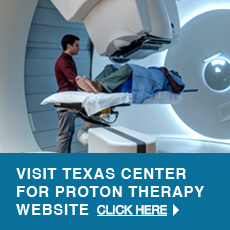Texas Center for Proton Therapy
 Texas Center for Proton Therapy uses protons to eliminate cancer cells with exceptional precision. Because it targets tumors with minimal damage to surrounding healthy tissue, proton therapy is one of the most promising developments in cancer treatment.
Texas Center for Proton Therapy uses protons to eliminate cancer cells with exceptional precision. Because it targets tumors with minimal damage to surrounding healthy tissue, proton therapy is one of the most promising developments in cancer treatment.
Texas Center for Proton Therapy features latest generation technology, including pencil-beam scanning paired with the latest in digital imaging onsite to optimize targeting and treating tumors. The technology within the center is amongst the most advanced available in the world and it is one of approximately 40 proton centers in the United States.
Proton therapy delivers high-energy proton beams directly to tumors, minimizing damage to surrounding healthy tissue and vital organs. Proton therapy is particularly beneficial in treating children and in cancers located close to critical organs and sensitive areas.
Latest Generation Technology
The 63,000-square-foot Irving-Las Colinas facility features an advanced, fixed beam treatment room and two isocentric gantry treatment rooms; each gantry room contains a 30-foot tall, 110-ton machine that rotates 360 degrees to enable the most accurate positioning of the proton beams on patient tumors with submillimeter accuracy. The proton beam equipment is anchored by a 220-ton cyclotron that can accelerate the protons to nearly the speed of light.
All three treatment rooms feature pencil-beam scanning. Small proton beams, measuring only millimeters wide, are rapidly scanned across the cancer target to precisely match the shape of the tumor. It allows for adaption to complex shaped or even moving tumors, improves dose conformity, and reduces excess radiation to normal tissues.
On board cone beam computed tomography (cone beam CT) provides clinicians the ability to use 3-D volumetric imaging (vs. 2-D X-ray images), which improves anatomic visualization, patient positioning, and allows more precise treatment of cancerous tumors.
The center also features some of the most advanced PET/CT and 3-Tesla MRI scanning and imaging technology available, as well as on-site lab services.
Patient-Centered Approach
Texas Center for Proton Therapy is dedicated to creating more cancer survivors and also improving their subsequent quality of life. Our patient-centered approach to care is evident in the new center, which is designed to create a positive and supportive patient experience. The center offers a full range of patient support services, focused therapeutic activities for patients, families, and caregivers, and a children’s activities room. The patient support services also assist out-of-town patients.
Expert Leadership
Dr. Andrew K. Lee, a renowned leader in oncology and innovator in proton beam therapy cancer treatment is the medical director of Texas Center for Proton Therapy. A radiation oncologist, Dr. Lee launched proton therapy treatment and treated the first patient at MD Anderson Cancer Center in 2006. In his role, Dr. Lee leads North Texas’ first and only facility offering the most innovative, latest-generation proton therapy treatment technology.
Dr. Lee was the first physician in North America to treat patients with spot-scanning proton therapy, commonly known as pencil-beam scanning, which enables greater conformality in tumor treatments compared to traditional proton beam therapy. He also pioneered the use of fiducial markers and image-guidance to improve tumor localization to optimize the accuracy of proton therapy. He is internationally recognized as a leader in prostate cancer proton therapy treatment.
Research
Reflecting its commitment to innovative research, the center provides patients the opportunity to participate in national clinical trials. A sophisticated team of healthcare professionals carefully monitors and evaluates developments in cancer research to ensure patients receive the latest and most comprehensive information on treatment advancements.
Benefits of Proton Therapy
Proton therapy:
- Is especially effective in treating cancers in sensitive areas and for children whose bodies are still growing.
- Uses high-energy, precisely targeted proton beams to destroy cancerous cells, leading to a lower recurrence rate for many patients.
- Reduces exposure and damage to surrounding healthy tissue and vital organs.
- Is non-invasive and may decrease side effects.
- Sometimes increases patients’ tolerance of chemotherapy.
- Can help patients maintain their current quality of life during and after treatment.
- Is sometimes effective in treating areas already treated with radiation.
Cancers Treated by Proton Therapy
Proton therapy most often treats tumors in sensitive areas where conventional therapies may not be the best option. It is a beneficial option for treating pediatric cancers because it minimizes damage to smaller bodies that are still developing. While proton therapy is not appropriate for all cancers, it is particularly effective for treating certain cancers including:
- Bladder
- Brain
- Breast
- Esophageal
- Head, neck, and skull base
- Lymphoma
- Liver
- Lung and thorax
- Pancreatic
- Pediatric
- Prostate
- Sarcoma
- Spinal
- Recurrent disease
Telemedicine
Patients who live outside of the Dallas-Fort Worth area may access highly specialized care from Texas Center for Proton Therapy via Texas Oncology’s Telemedicine capability. While patients would need to travel to the center to receive treatment, in some cases, initial consultations and some follow-up care can be conducted via Telemedicine – and always in close coordination with a local Texas Oncology physician. Learn more about Telemedicine.